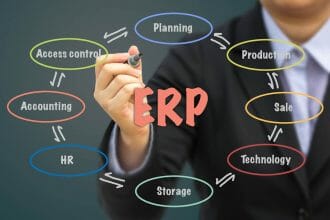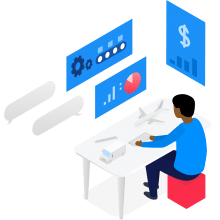
Enterprise resource planning (ERP) systems use software and technology to store, manage, collect, disseminate, and interpret data. They let companies organize, interpret, and share information between separate departments easily, increasing efficiency and streamlining businesses. Here are some of the ways that ERP can help your organization cut costs.
Resource Management
ERPs helps companies cut costs by managing their inventories efficiently and allowing them to avoid ordering too much product or needing additional square footage in warehouses for storage. An ERP lets users view all inventory data in real time. You can configure your ERP software to alert the relevant people when the stock of any item falls below a certain level. This lets businesses and their employees avoid having to check stock levels manually. It also allows organizations to monitor inventory at multiple locations from one application. Transferring stock when necessary is easier, and you can save by preventing overstocking or understocking.
Customer Relationship Management
Integrating CRM or customer relationship management software with ERP makes both programs more efficient and cost-effective. It can help companies save money on marketing, customer service, and sales. It also uses data from thousands of customers to make decisions about marketing and sales easier. For example, you can decide which ads are successful and make informed changes without needing to take additional time for research. ERP with CRM also helps keep customers loyal by improving service.

Data Management
An ERP system can create charts, graphs, and other visual reports to make data easy to understand. Performance overviews, customer service trends, inventory patterns, cash flow patterns, and marketing and sales reviews will be easier to understand. An ERP can put these reports together quickly and allow owners and managers to control who sees what data. That way, data will be readily available to authorized users, and it will be protected from employees who shouldn’t have access. You can have great security without interfering with your business’s flexibility or communication.
Fewer Costs for Administration
Your employees won’t have to complete audits by hand or analyze data. An ERP system generates logs every time an employee alters a record. This lets it finish audits for you quickly and easily. It prevents mistakes and saves time, allowing businesses to reduce labor costs. An ERP will recognize an invalid entry and warn you about the problem before it gets saved.
Tax Savings
An ERP consolidates all of your business’s financial information to make taxes easier. Having precise records of all your business expenses will let you increase your tax deductions and save money. Simplifying expense and income tracking will help companies avoid accounting and calculation errors on parts of their tax returns and in the rest of their business procedures.
ERP can save people in all departments of your business time and effort. They can spend that time selling products or training new employees, or managers can go home and get some extra rest. ERP also makes communicating between departments simpler and reduces the skills needed to participate in complex manufacturing processes.
This is an article provided by our partners network. It might not necessarily reflect the views or opinions of our editorial team and management.
Contributed content

Founder Dinis Guarda
IntelligentHQ Your New Business Network.
IntelligentHQ is a Business network and an expert source for finance, capital markets and intelligence for thousands of global business professionals, startups, and companies.
We exist at the point of intersection between technology, social media, finance and innovation.
IntelligentHQ leverages innovation and scale of social digital technology, analytics, news, and distribution to create an unparalleled, full digital medium and social business networks spectrum.
IntelligentHQ is working hard, to become a trusted, and indispensable source of business news and analytics, within financial services and its associated supply chains and ecosystems




























